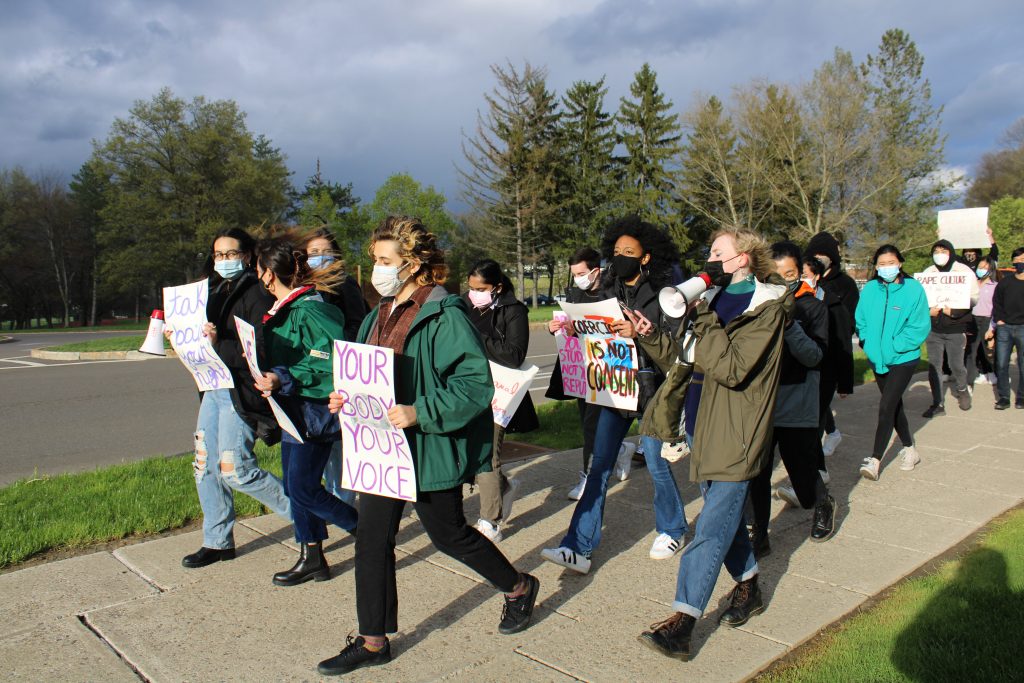On Friday, April 30, around 100 students joined Binghamton University’s Women’s Student Union (WSU) in their annual “Take Back the Night” rally against sexual and interpersonal violence. The group marched around the Brain twice, chanting “Sexual violence has got to go” and holding signs that read “Support survivors” and “You are not alone.”
The rally was the penultimate event of the WSU’s “Week of Action,” recognizing the end of Sexual Assault Awareness Month. It was one of only two in-person events in the series.
“Take Back the Night” traces its roots to an annual international march founded in the 1970s. WSU has hosted the event on BU’s campus for nearly 50 years, but the club’s historian, Aubrey Doyen, a junior majoring in biology, noted that the event takes on a new salience this year. The Instagram account @shareyourstorybing emerged in June of 2020 where members of the BU community recounted their experiences of sexual and interpersonal violence.
“Everything has come to light, but [the BU administration] hasn’t taken enough action,” Doyen said. “It’s important the people recognize how many survivors there really are, and we need to call out rape culture wherever we see it.”
The rally began on BU’s Peace Quad, in front of the Couper Administration Building, home to the offices of BU’s top administrators. WSU’s treasurer, Eliza Kamerman, a junior majoring in environmental studies, expressed frustration with these administrators and hoped the rally would draw their attention.
“The administration refuses to admit there is a rape culture in this University and that sexual/interpersonal violence is rampant,” Kamerman wrote in an email. “Many administrators in and out of the Title IX office repeatedly prioritize university image, putting the protection of offenders over the well-being of survivors. ‘Take Back the Night’ is an opportunity to demonstrate to the administration that we see what they’re doing and that the community will not remain unsupported.”
One participant in the rally, Maggie Baker, a junior majoring in mechanical engineering, explained that the rally helps signal to the BU administration that students demand action.
“We are showing the administration that we will take action, and we are not going to stand for the way they’ve been treating sexual assault survivors,” Baker said. “We want to show survivors that we’re not just behind a screen. We will back them up in person as well.”
After the march, the group returned to the Peace Quad. WSU E-Board members handed out rain ponchos to prepare for the impending showers, as Haley Murphy, campus sexual assault liaison for the Crime Victims Assistance Center (CVAC), joined by her two dogs, took the stage and informed protestors of CVAC’s role in supporting survivors.
“We have a whole team of legal advocates and a staff attorney that can support victims through any criminal or civil legal processes they wish to utilize,” Murphy wrote in an email. “If victims don’t want to report we also provide crisis counseling, case management and coordination with the office of victims services all completely free of charge and confidential.”
Alexandra Miranda, WSU’s president and a junior triple-majoring in sociology, human development and Latin American and Caribbean studies also took the stage. She explained that WSU aims to create a safe space that supports survivors.
“I hope that everyone here today knows that if the administration isn’t on your side, we are,” Miranda said. “We believe you. We stand by you.”
Additionally, she discussed WSU’s role in creating the Violence, Abuse and Rape Crisis Center (VARCC) on campus, which brings together resources such as CVAC, trauma counselors, advocates and more to help survivors easily access all of the services they might need.
Samantha Carroll, incoming vice president for academic affairs of BU’s Student Association (SA) and a sophomore majoring in philosophy, politics and law, expressed that the VARCC helps fill a critical gap in supporting survivors, but the BU administrators need to address the roots of the problem to facilitate prevention.
“We need better survivorship support,” Carroll said. “We are already sort of on the right track with the creation of the VARCC and better resources for survivors, but it can always go further and there’s still underlying systemic problems.”
Participants remained at the Peace Quad for another two hours despite heavy winds and rain for the “Survivor Speakout,” where survivors of sexual and interpersonal violence shared their experiences with the crowd, highlighting the prevalence of these instances within the BU community.
One protestor, Emily Worth, a sophomore majoring in business administration, said that it was precisely this pervasiveness of violence that motivated her to join WSU in the rally.
“We came to show that we are in solidarity with sexual assault victims because [BU] has a prevalent sexual assault problem,” Worth said. “We want to change that. We want to bring attention to the University so they can take action.”



